Guidelines
Planning
1. The Bishop has agreed that permission may be sought from her for the admission of children to Communion before Confirmation. It is important that such a step forward in the life of the Church should be taken prayerfully and carefully.
2. Incumbents, PCC’s, congregations, parents and children must have some understanding of what is being proposed, and of the significance of Holy Communion within the life of the Church.
3. Applications for permission should be submitted on the Parish Application Form and accompanied by a resolution of the PCC supporting this policy. These should be sent to the Bishop’s Chaplain.
4. Children to be admitted to Holy Communion should already be part of the worshipping community. They should themselves express a wish to receive the Sacrament. The age at which they may be admitted should be at the discretion of the Incumbent provided that the appropriate criteria are fulfilled.
5. As baptism is the rite of initiation for all Church members, it follows that those who become communicants must be baptised. If a child has not been baptised already, this should be arranged before the beginning of the course of preparation.
Preparation and Implementation
1. A Course of preparation for the children should stress the theme of ‘Belonging to the Body of Christ’. Their reception at Holy Communion is a sign that they are already members of Christ’s Body. Value each child equally; adaptations for the inclusion of children with learning difficulties should apply where appropriate. You can find resources below.
2. Parents and carers should give their permission for their children’s participation and be encouraged to support them. They should be fully informed about the preparation and admission procedure and should be invited to share positively with clergy and leaders in the preparation.
Admission
1. A simple act of admission during Holy Communion should be arranged. The families of children to be admitted should be asked to participate. Certificates should be given to the children, and their names entered in a register kept for this purpose.
2. The priest must decide exactly how much of the liturgy the communicant children will attend. Even if there is a separate ‘Ministry of the Word’ for children, anyone who is to receive Holy Communion should be present in the main service at least for the Eucharistic prayer.
3. When communicant children move to another parish it is expected that they should continue their Sacramental life. They must be commended to the receiving Incumbent.
Some notes on Children & Holy Communion
General Synod discussed and agreed the paper “The Admission of Baptised Children to Holy Communion” on 8th February 2006. It came into force on 15th June 2006. See:
Microsoft Word - GS 1596.rtf
Theology
Questions around the theology of children being admitted to Holy Communion hinge around the significance attached to baptism and confirmation. Baptism ,understood as one complete rite of initiation means that the baptised are all wholly part of the Body of Christ. The baptism liturgy proclaims our equality and unity in Christ – “we welcome you, we are children of the same heavenly Father”
When Jesus placed a child in the midst of the disciples, he was pointing out the importance of children as people who belong to the kingdom of God but also pointing to the way that children remind us that faith has to be child-like. Children help us to remember that faith is simple and not meant to be over-complicated.
The communion meal is about meeting with Jesus and we can all do that whatever our age.
Practical Reasons for Admitting children
Research tells us that 38% of Christians said they came to faith before the age of 5 and a further 24% before the age of 10. It is important for us to recognise that children are able to respond to God and need to be encouraged as they grow and learn how to be disciples of Christ from an early age.
The Church of England report, ‘Rooted in the Church’ highlighted a clear link between children receiving communion and those young people who remained part of the church into adulthood. It was mentioned in every interview as a source of frustration for those who were not allowed to receive communion.
Children and young people need to be part of the whole church community in order to grow into a mature faith. “The experience of belonging is the basis for nurture and growth in the Christian life” (On the Way 1995) Joining with others in the congregation as equals around the eucharistic table is a hugely important symbol and practical sign that we are all equally part of the body of Christ and children will see and hear that, 'You are welcome here'.
Video Resource
Children and young people from Living Brook benefice, Northampton made a short film for their PCC explaining why they wanted to be included in Holy Communion. Entitled, ‘One Bread, One Body’
Downloads
Parish Application Form - please complete this form and return by email to the Bishop's Chaplain
Certificate of Admission to Holy Communion before Confirmation
These guidelines in PDF format.
Resources for Preparation
The following books and course materials are recommended for use as preparation material with children and their parents. The Children & Youth Team are also available for advice and support.
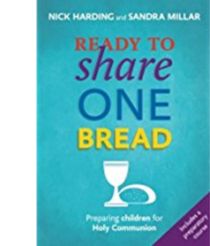 |
Ready to Share One Bread: Preparing Children for Holy Communion. Nick Harding & Sandra Millar, 2015 A 'one-stop shop' for churches considering the admission of children to Holy Communion This book contains all a church would need to explore admitting children, including resources for exploring the issue with a whole congregation, case studies from real-life churches, a preparation course, an admission liturgy and advice on including and involving children in Eucharistic worship. The book also includes theological reflection on children and Holy Communion from Michael Perham and considers the impact of receiving Holy Communion on children's discipleship. |
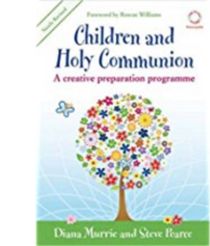 |
Children and Holy Communion: A Creative Preparation Programme. Diana Murrie & Steve Pearce, 2003 Children and Holy Communion presents many convincing reasons for the admission of children to Holy Communion, based on the actual experiences of churches. It offers an invaluable practical aid to preparation for Holy Communion in the form of a six-session course with notes for leaders and photocopiable ‘Talkabout’ take-home sheets. |
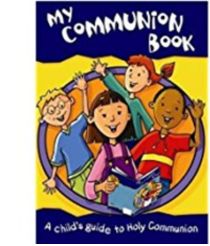 |
My Communion Book 2nd ed: A Child's Guide to Holy Communion This resource for children and families is primarily aimed at 4 to 8 year olds. It can be used initially as a sharing book, adult and child reading together, but children may use it at times on their own. Taking the child through the service, the book explains key words and asks questions that relate directly to the child, helping them to engage with the service of Holy Communion in a fun, interesting and meaningful way. |
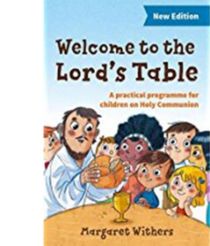 |
Welcome to the Lord's Table: A practical programme for children on Holy Communion Margaret Withers, 2017 A fully revised edition of a highly successful programme, used in many churches throughout the UK. It has been brought up to date, fully reflecting changes in both church process and church culture over recent years. Aimed to enable children aged 7 - 9 to participate fully in eucharistic worship, the introductory chapters explore the background to the question of preparing young children for Holy Communion, give guidance on preparing the congregation, training leaders and involving the family, and include a guide to using the programme. The programme itself comprises eleven flexible teaching units and is designed to last approximately three months overall, with the children receiving Holy Communion towards the end of the programme. |
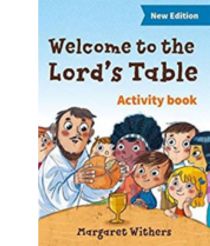 |
Welcome to the Lord's Table activity book Every page in this book has been designed to help you mark a very important journey. Step by step it will help you to learn all about belonging to God's family. So it's about you and God. You can fill in the pages by yourself, or with the help of a grown-up. If you are using this activity book as part of your church's Welcome to the Lord's Table programme you will have the opportunity to offer it at your first Holy Communion as a sign that you belong to God and are part of his family. |
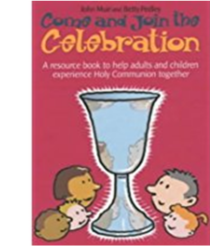 |
Come and Join the Celebration: A Resource Book to Help Adults and Children Experience Holy Communion Together John Muir & Betty Pedley Not preparation material but resources for including children in the service of Holy Communion. This photocopiable resource contains guidance on how to help children understand the liturgy and structure of Holy Communion; activities for use in church with 2-6 year olds; resource sheets for 7-11 year olds; and ideas for additional uses including Communion before confirmation, workshops and school Eucharists. The book aims to help adults share worship with children, thus enabling everyone to participate more fully. |
 |
I Belong by Aileen Urquhart Redemptorist Publications, 1988 A complete resource with Leader’s Guide, Parent’s Guide and Children’s book. Produced for the Catholic church, it will be suitable for preparation for those in this tradition but also elsewhere. Themes are based on the framework of the mass and includes material for parent’s sessions and resources for ‘family time’ at home. |
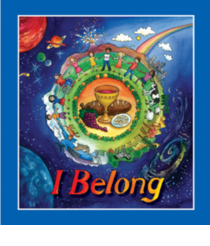 |
I Belong Children’s book to accompany the course. |
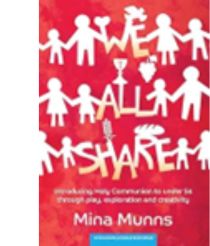 |
We All Share: Introducing Holy Communion to under 5’s through play, exploration and creativity. Mina Munns, 2018 (Kevin Mayhew.) Practical ways to help our very youngest children to engage with the story of Holy Communion. Not a preparation course but a helpful resource for use in eucharistic worship. |